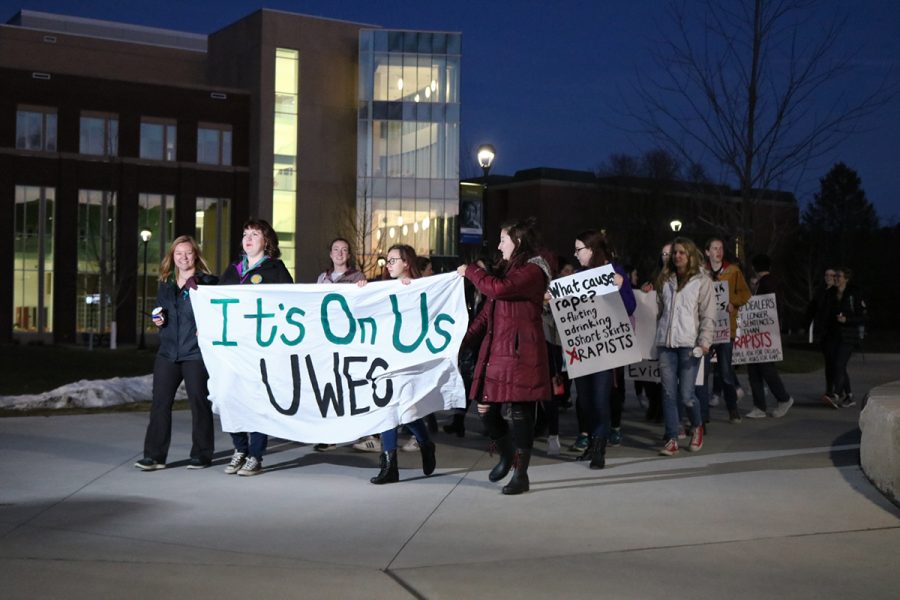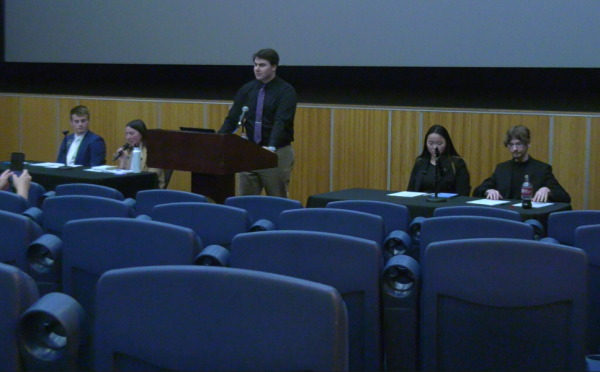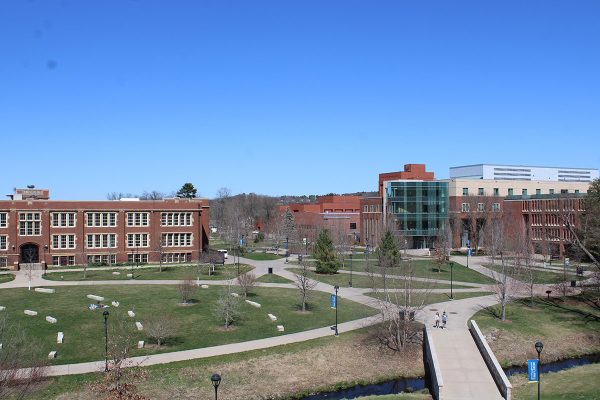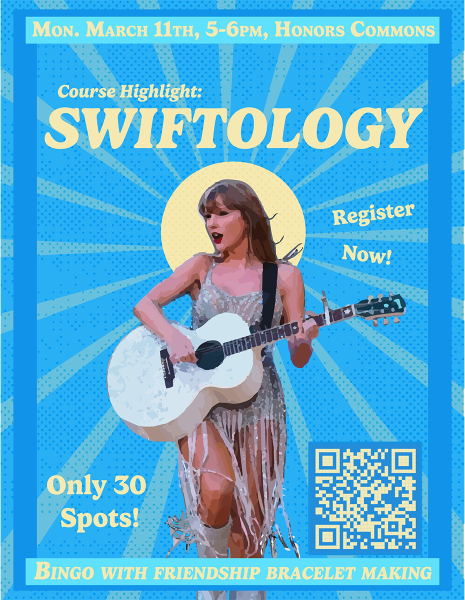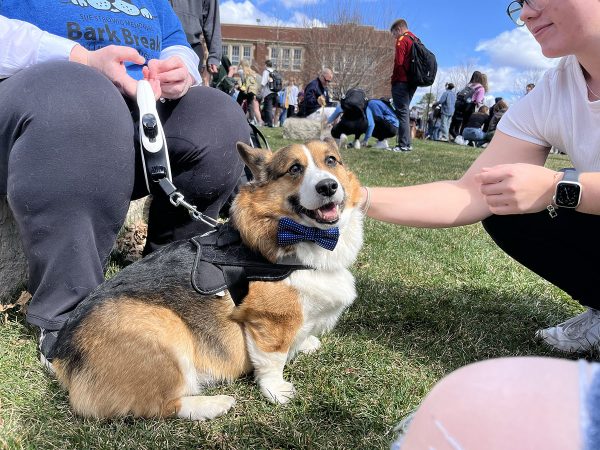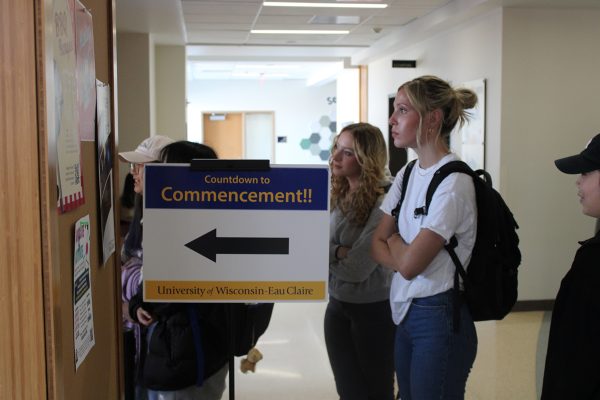It’s On Us offers support to those in need
Students gather in campus mall to protest sexual assault
Photo by Sam Farley
The protesters marched through campus and down Water Street to help spread awareness of sexual assault.
Students gathered on Thursday in the UW-Eau Claire campus mall to raise their voices against sexual assault and rape culture on college campuses. Student advocates for sexual assault survivors and Student Senate partnered with It’s On Us to organize this candlelit protest.
It’s On Us, according to its website, is a national campaign whose overarching goal is to eradicate sexual assault. The movement was launched in September 2014 in response to recommendations made by the White House Task Force to Prevent Sexual Assault, which emphasized the need for everyone to be engaged in the effort to end sexual violence.
“It’s On Us asks everyone — students, community leaders, parents, organizations, and companies — to step up and realize that the conversation changes with us,” the website says.
The campaign was brought to UW-Eau Claire for the first time this year as a way to implement outreach and prevention training programs.
Before the march down Water Street commenced, people from the crowd were invited to go up to the microphone and share their story, or someone else’s, as attendees observed a moment of silence for survivors.
Madeline Frances, a second-year graphic communications student, shared her sister’s story. After explaining how her sister “essentially walked in (to court) and got called a liar,” she went on to talk about how sexual assault and rape culture are issues that go beyond her sister’s experience.
“I don’t think anyone here has, you know, not heard a story or has not known someone who has had this happen to them,” Frances said. “It’s actually really depressing that all of us have heard a story or have known someone who’s had this happen to them and, in most cases — if not all cases — nothing is done. They’re called a liar and a slut and one of the first questions they’re asked is “Were you drinking?” or “What were you wearing?” That shouldn’t matter at all … The one thing you need to say is “I believe you” and “I believe in you” and “I believe that happened to you.””
According to the U.S.’s largest nonprofit anti-sexual assault organization — Rape, Abuse & Incest National Network — everyone knows at least one person who has been affected by sexual violence, reaffirming Frances’s claims.
RAINN statistics show that women who are between the ages of 18 and 24, and are in college, are three times more likely to experience sexual violence than the average women.
The statistics are even more extreme for undergraduate students, with 23.1 percent of females and 5.4 percent of males experiencing rape or sexual assault through physical force, violence, or incapacitation at some point during their college careers, the RAINN website says.
To stop these statistics from rising, students are encouraged to take the pledge on the It’s On Us website where they are striving to “create a culture of consent, bystander intervention and survivor support.”
Though the Center for Awareness of Sexual Assault is a viable resource on campus, it is not funded through the school, and is not able to host outreach and prevention training programs, according to Student Senate. Therefore, by joining the It’s On Us campaign, students are able to participate in events like this protest and engage in conversations about stopping sexual assault.
CASA was established in 2003 and, since then, the organization has maintained an approach that is centered around helping victims.
“We provide a safe place for people to come and talk about any issues that they may have surrounding their sexual assault, or those of someone close to them,” the CASA website said.
Amanda Mondlock, victims services director at CASA, talked about some of the services they provide.
“We’re really blessed in the Chippewa Valley,” Mondlock said. “We have three agencies that are funded through various resources to provide sexual assault services to our community. All of our agencies are free and confidential. We have a 24-hour crisis line. We do mostly one-on-one non-therapeutic counseling, support groups, legal and medial advocacy and information. We accompany people to court, make sure their rights are being advocated for and met through the whole process.”
Anyone who has been sexually assaulted can call the National Sexual Assault Hotline at (800)-656-4673, the CASA hotline at 836-HELP or visit online.rainn.org to chat anonymously.
Eau Claire students who have been assaulted are encouraged to seek medical attention and report the assault to the police and university officials. Students can also visit Counseling Services or CASA on campus to talk to counselors and learn about joining support groups.
Kuchta can be reached at [email protected]
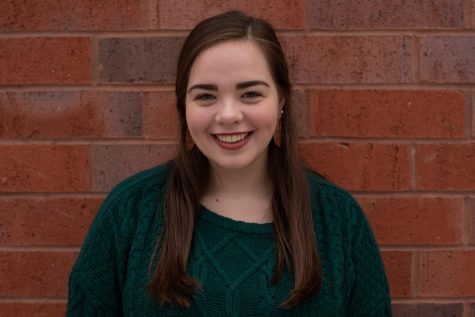
Tiana Kuchta is a fourth-year English critical studies student. Outside of The Spectator, she enjoys spending her time reading, being with family, catching up on Netflix and being surrounded by cats.

